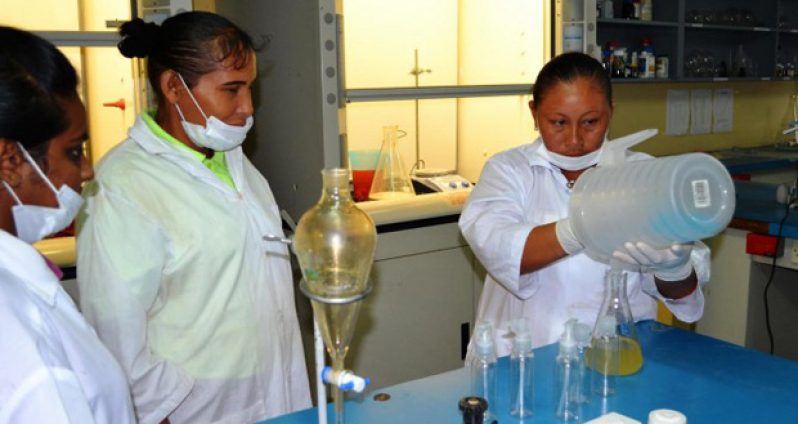THE first group of Indigenous producers from Region Nine who, via a partnership between the Ministry of Social Cohesion and the Institute of Applied Science and Technology (IAST), have been able to benefit from assistance to improve their standards of production, have been participating in enhancement and quality assurance training at the IAST laboratories.

Last Tuesday, 15 persons were flown to Georgetown and taken to the labs for training, where they were introduced to the technology being used to improve the textures and scents of the soaps and lotions that they produce.
They were also taught to utilise materials in their environment to achieve the same standard as those produced in the laboratory.
The Ministry and IAST had, in November, committed to undertake projects aimed at increasing the earning power of Amerindian producers, in keeping with the Ministry’s goal of empowering communities to enhance the lives of their citizens.
Minister of Social Cohesion, Ms Amna Ally, said social cohesion and national unity cannot be achieved without economic and financial stability. As such, she said, the Ministry is engaging stakeholders to determine what is needed to support community empowerment.
At that first meeting with farmers and producers, Professor Suresh Narine, Director of the IAST, had committed to flying 15 members from the working groups to the IAST labs in Georgetown, so they may see first-hand the enhancement methods that are being used to add value to their products.
The IAST and the Ministry have since been working with the Macusi Research Unit (MRU) and Medicine from Trees Women’s Group to add value to their products by adding scents and flavours to hygiene and beauty care items such as soaps, body lotions and oils; making them into attractive shapes and sizes to ensure access to higher-priced markets.
The partnership has already seen farmers and other producers being able to better develop and market their products, and boost their earning power.
In an invited comment, Dr Narine said that, over the past decade or so, there has been a movement of indigenous products and knowledge into the market place. However, he noted that, to compete with the outside world, quality and consistency must be assured.
QUALITY
“The personal care market place is a market place that is high profits and high value, but it’s an appropriate place to move our botanicals into, not just crabwood oil but other botanicals. When you take cultural anthropology and medicinal anthropology like botanicals and you put (them) into modern products, you are marrying modern science with ancient cultural practices, and it’s very important in that transformation that you pay attention to quality, to expected standards that the world has for those products. It’s important to make a high-quality product that is safe and has attributes beyond the additives. That is what the market place is about,” Dr Narine said.
According to a Ministry of the Presidency release, Dr Narine noted that the groups have been working with these materials for a very long time, and the role of the IAST “is just to help regularise their methods to ensure that the products they make meet international standards”.
“So what we have done is, we have taken all of their raw materials from their communities and we have optimised (them). We have ensured that the soaps can be made safely, reproducibly, and with quality. We added food grade colourants to make it more appealing, and fragrances from plants that are grown locally. We also developed liquid soaps, single-use personalised bars, moulded soaps with different patterns, and liquid soaps which are carefully controlled in terms of (their) viscosity, and so on,” he said.
The group was also taught the science of soap making, how to deal with variables, branding for the products, how to maximise profits, maximising raw materials and labour, cost-to-profits ratios, and how to draft a business plan to access funding.
Additionally, on a monthly basis, random testing will be conducted by the IAST, to ensure that quality control is maintained, and technical support will be given until the producers can meet that standard.
With regard to peanut butter producers in the region, the IAST will be providing the necessary equipment to repair broken machinery to put production back on track.
Several other projects are expected to be undertaken in the New Year.



.jpg)








